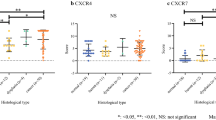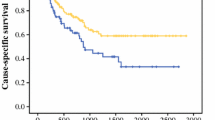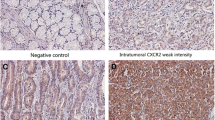Abstract
CXC chemokines have been reported to play critical roles in tumor growth, angiogenesis, invasion and metastasis of various human cancers. However, expression of CXC chemokines type 2 (CXCR2) and its association with clinicopathological characters and patients’ prognosis in esophageal cancer are scarcely reported. We retrospectively collected clinicopathologic characteristics of 95 esophageal cancer patients undergoing esophagectomies. Immunohistochemistry was used to detect the expression of CXCR2. The survival was analyzed by the Kaplan–Meier method. Univariate and multivariate analyses were then performed to determine the relationship between CXCR2 and the clinical characteristics and to analyze whether CXCR2 expression was a significant independent prognostic factor for esophageal cancer patients. CXCR2 was highly expressed in 57.9 % of the randomly selected specimens. The expression of CXCR2 was significantly related to lymph node metastasis (P = 0.044) and predicted poor overall status in operable esophageal cancer patients (P = 0.012). Cox proportional hazard analysis regression analysis indicated that CXCR2 expression (P = 0.030) and lymphatic metastasis (P < 0.001) may serve as independent prognostic markers for esophageal cancer patients. Our results demonstrate that CXCR2 significantly correlates with lymph node metastasis and is a poor prognostic factor in resected esophageal squamous cell carcinoma.



Similar content being viewed by others
References
Siegel R, Naishadham D, Jemal A. Cancer statistics, 2013. CA Cancer J Clin. 2013;63(1):11–30.
Hannelien V, Karel G, Jo VD, Sofie S. The role of CXC chemokines in the transition of chronic inflammation to esophageal and gastric cancer. Biochim Biophys Acta. 2012;1825(1):117–29.
Richmond A. Chemokine research moves on. Exp Cell Res. 2011; 317(5):553–555. PubMed PMID: 21241691. Pubmed Central PMCID: 3056356.
Raman D, Sobolik-Delmaire T, Richmond A. Chemokines in health and disease. Exp Cell Res. 2011; 317(5):575–589. PubMed PMID: 21223965. Pubmed Central PMCID: 3063402.
Keeley EC, Mehrad B, Strieter RM. Chemokines as mediators of tumor angiogenesis and neovascularization. Exp Cell Res. 2011; 317(5):685–690. PubMed PMID: 21040721. Pubmed Central PMCID: 3073599.
Han L, Jiang B, Wu H, Wang X, Tang X, Huang J, et al. High expression of CXCR2 is associated with tumorigenesis, progression, and prognosis of laryngeal squamous cell carcinoma. Med Oncol. 2012;29(4):2466–72.
Ijichi H. Inhibition of CXCLs/CXCR2 axis in the tumor microenvironment might be a potent therapeutics for pancreatic cancer. OncoImmunology. 2012;1(4):569–71.
Hertzer KM, Donald GW, Hines OJ. CXCR2: a target for pancreatic cancer treatment? Expert Opin Ther Targets. 2013; 17(6):667–680. PubMed PMID: 23425074. Pubmed Central PMCID: 3686651.
Vandercappellen J, Van Damme J, Struyf S. The role of CXC chemokines and their receptors in cancer. Cancer Lett. 2008;267(2):226–44.
Wang B, Hendricks DT, Wamunyokoli F, Parker MI. A growth-related oncogene/CXC chemokine receptor 2 autocrine loop contributes to cellular proliferation in esophageal cancer. Cancer Res. 2006;66(6):3071–7.
Allegretti M, Cesta MC, Garin A, Proudfoot AE. Current status of chemokine receptor inhibitors in development. Immunol Lett. 2012;145(1–2):68–78.
Yanagawa J, Walser TC, Zhu LX, Hong L, Fishbein MC, Mah V, et al. Snail promotes CXCR2 ligand-dependent tumor progression in non-small cell lung carcinoma. Clin Cancer Res Off J Am Assoc Cancer Res. 2009; 15(22):6820–6829. PubMed PMID: 19887480. Pubmed Central PMCID: 2783274.
Garin A, Proudfoot AE. Chemokines as targets for therapy. Exp Cell Res. 2011;317(5):602–12.
Singh S, Sadanandam A, Nannuru KC, Varney ML, Mayer-Ezell R, Bond R, et al. Small-molecule antagonists for CXCR2 and CXCR1 inhibit human melanoma growth by decreasing tumor cell proliferation, survival, and angiogenesis. Clin Cancer Res Off J Am Assoc Cancer Res. 2009;15(7):2380–6.
Hu D, Du C, Xue W, Dou F, Yao Y, Gu J. The expression of chemokine receptors CCR6, CXCR2 and CXCR4 is not organ-specific for distant metastasis in colorectal cancer: a comparative study. Histopathology. 2013; 63(2):167–173. PubMed PMID: 23758411. Epub 2013/06/14. Eng.
Wente MN, Keane MP, Burdick MD, Friess H, Buchler MW, Ceyhan GO, et al. Blockade of the chemokine receptor CXCR2 inhibits pancreatic cancer cell-induced angiogenesis. Cancer Lett. 2006;241(2):221–7.
Cheng WL, Wang CS, Huang YH, Tsai MM, Liang Y, Lin KH. Overexpression of CXCL1 and its receptor CXCR2 promote tumor invasion in gastric cancer. Ann Oncol Off J Eur Soc Med Oncology/ESMO. 2011;22(10):2267–76.
Zhao M, Wimmer A, Trieu K, Discipio RG, Schraufstatter IU. Arrestin regulates MAPK activation and prevents NADPH oxidase-dependent death of cells expressing CXCR2. J Biol Chem. 2004;279(47):49259–67.
Wang B, Khachigian LM, Esau L, Birrer MJ, Zhao X, Parker MI, et al. A key role for early growth response-1 and nuclear factor-B in mediating and maintaining GRO/CXCR2 proliferative signaling in esophageal cancer. Mol Cancer Res. 2009;7(5):755–64.
Varney ML, Singh S, Li A, Mayer-Ezell R, Bond R, Singh RK. Small molecule antagonists for CXCR2 and CXCR1 inhibit human colon cancer liver metastases. Cancer Lett. 2011; 300(2):180–188. PubMed PMID: 21035946. Pubmed Central PMCID: 2994987.
Conflict of interest
We declare that we have no financial and personal relationships with other people or organizations that can inappropriately influence our work.
Author information
Authors and Affiliations
Corresponding author
Additional information
Ping Sui and Pingping Hu have contributed equally to this work.
Rights and permissions
About this article
Cite this article
Sui, P., Hu, P., Zhang, T. et al. High expression of CXCR-2 correlates with lymph node metastasis and predicts unfavorable prognosis in resected esophageal carcinoma. Med Oncol 31, 809 (2014). https://doi.org/10.1007/s12032-013-0809-z
Received:
Accepted:
Published:
DOI: https://doi.org/10.1007/s12032-013-0809-z




